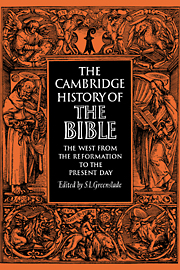Book contents
- Frontmatter
- Chapter I The Bible in the Reformation
- Chapter II Biblical Scholarship: Editions and Commentaries
- Chapter III Continental Versions to c. 1600
- Chapter IV English Versions of the Bible, 1525–1611
- Chapter V The Religion of Protestants
- Chapter VI The Bible in the Roman Catholic Church from Trent to the Present Day
- Chapter VII The Criticism and Theological Use of the Bible, 1700–1950
- Chapter VIII The Rise of Modern Biblical Scholarship and Recent Discussion of the Authority of the Bible
- Chapter IX Continental Versions from c. 1600 to the Present Day
- Chapter X English Versions since 1611
- Chapter XI The Bible and the Missionary
- Chapter XII The Printed Bible
- Chapter XIII Epilogue
- Appendices
- Bibliography
- Notes on the Plates
- Index
- Plate Section
- References
Chapter II - Biblical Scholarship: Editions and Commentaries
Published online by Cambridge University Press: 28 March 2008
- Frontmatter
- Chapter I The Bible in the Reformation
- Chapter II Biblical Scholarship: Editions and Commentaries
- Chapter III Continental Versions to c. 1600
- Chapter IV English Versions of the Bible, 1525–1611
- Chapter V The Religion of Protestants
- Chapter VI The Bible in the Roman Catholic Church from Trent to the Present Day
- Chapter VII The Criticism and Theological Use of the Bible, 1700–1950
- Chapter VIII The Rise of Modern Biblical Scholarship and Recent Discussion of the Authority of the Bible
- Chapter IX Continental Versions from c. 1600 to the Present Day
- Chapter X English Versions since 1611
- Chapter XI The Bible and the Missionary
- Chapter XII The Printed Bible
- Chapter XIII Epilogue
- Appendices
- Bibliography
- Notes on the Plates
- Index
- Plate Section
- References
Summary
Biblical Humanism and its Resources
Near the time when Lefèvre issued his version of the Epistles of St Paul with commentaries from the press of Henri Estienne at Paris in 1512, he said to the young Guillaume Farel, ‘My son, God will renew the world and you will be a witness of it.’ Ten years later, he gave as one ground for this hope that, amid the discovery of new lands and the wider diffusion of the name of Christ, ‘the knowledge of languages and especially of Greek and Latin (for it was only later that the study of Hebrew letters was reanimated by Johann Reuchlin), began to return about the time when Constantinople was captured by the enemies of Christ…’. Here is confident enthusiasm for the potent renewal, spiritual and intellectual, to be found in a clearer understanding of Latin, Greek and Hebrew. This is something new and fundamental to the cultural world of the early sixteenth century: it cannot be set down as merely a further stage in the development of humanist studies which had begun in the fourteenth century or earlier. There was a preparatio evangelica in the first quarter of the sixteenth century, for it was then, and not before, that there appeared in combination the achievements of the humanist scholar-printers; the fruits of intensive study in the grammar and syntax of the three languages; and the energy provided by the economic development and regional patriotism of the cities where bonae litterae flourished—Basle, Wittenberg, Zurich, Paris, Strassburg, Geneva.
- Type
- Chapter
- Information
- The Cambridge History of the Bible , pp. 38 - 93Publisher: Cambridge University PressPrint publication year: 1963
References
- 3
- Cited by



